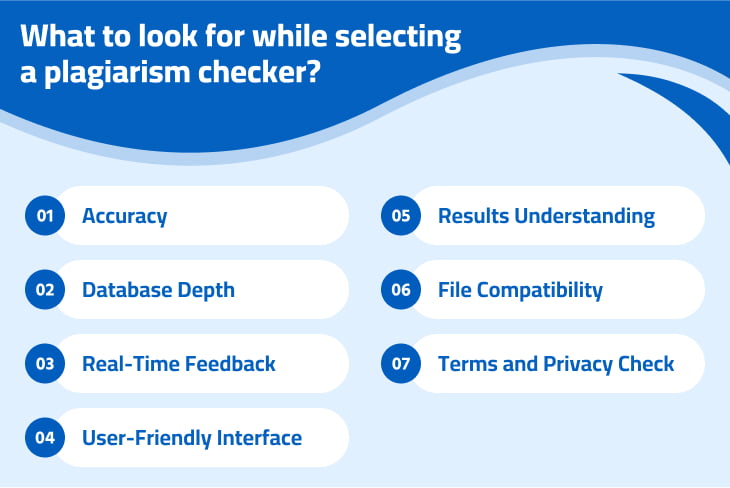What to look for while selecting a plagiarism checker?

Here are key factors to consider when choosing a plagiarism checker:
- Look for a plagiarism detector with a high level of accuracy in detecting similarities. For thorough content inspection, it must be able to spot both minor and major cases of plagiarism.
- The quantity and variety of a plagiarism detector’s database determine how successful it is. A bigger database makes it more likely to find matches, allowing for a more in-depth study.
- Furthermore, choose an app that lets you examine your copy in real-time so you can get feedback on how original it is right away. This is especially helpful for professional and academic writing, where it’s common to need to make rapid decisions.
- Select an easy-to-use plagiarism detector with a clear user interface. Users should be able to upload, scan, and understand data with little complexity by using an intuitive interface.
- The tool should not only highlight potential instances of plagiarism but also assist in understanding and interpreting the results.
- Make sure the plagiarism detector is compatible with a wide range of file types, such as Word, PDF, and plain text. This guarantees ease of use and versatility while examining content on many platforms.
- Additionally, check the terms of service and privacy policies to understand how the tool manages and protects the content you upload.
Which is the best plagiarism checker?
PapersOwl
It is a well-designed plagiarism checker that is simple to use and completely free. Simply paste the text, and the program will quickly scan and compare it with a vast amount of web literature.
You may also upload and review text documents with it. When the tool is finished, it displays the proportion of copied content and emphasizes any overlaps that were discovered.
Although PapersOwl does not provide a premium plan, they do offer a text improvement service. You may ask the work to be modified, for example, in order to remove any plagiarism.
Unicheck
It is a powerful plagiarism prevention tool for education, business, and personal use. It displays only meaningful matches and skips common phrases. Unicheck even reveals digital trickery and flags suspicious text formatting.
If needed, you can exclude previous papers, bibliographies, self-plagiarism, or quotes to get relevant results. Institutions are allowed to create their own private textbases for future checking.
Unicheck doesn’t store checked texts but saves all the reports so you can review them when necessary.
Quetext
It markets itself as a feature-rich plagiarism checker for educators, learners, and content creators. It makes use of Deep Search Technology, which may identify fuzzy and almost-exact matches that hide plagiarism. You may upload five to one hundred files at a time, depending on your plan, and it supports specific URL exclusion.
Color-grade technology makes it easy to locate plagiarized fragments. Quetext can assist you with citations if necessary. All you have to do is enter the source’s details, and the program will automatically include a citation in your bibliography.
Quillbot
Quillbot’s performance varies depending on the type of source. It can not do well on any of the two rewrite tests; it was only effective at detecting Copy & Paste plagiarism. It has trouble identifying picture-based sources and intellectual material.
It’s interesting to see that various outcomes were obtained even though Quillbot is driven by Copyleaks. Although the same outcomes were anticipated, Quillbot’s performance was worse than Copyscape’s.
Conclusion
It is crucial for content writers to uphold the highest standards of integrity and guarantee uniqueness. An important part of this procedure is choosing the appropriate plagiarism detector.
The best plagiarism detector for content writers is one that fits their demands and tastes, even if there are many options accessible. In addition to spotting possible plagiarism, a trustworthy plagiarism detector improves writing quality by encouraging originality and averting mistakes made by accident.

